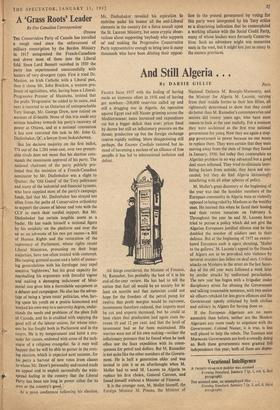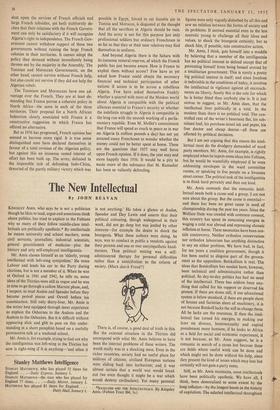And Still Algeria . • • FRANCE faces 1957 with
the feeling of having made an immense effort in 1956 and of having got nowhere-,--200,000 reservists called up and still a dragging war in Algeria. An operation against Egypt and still Nasser grinning across the Mediterranean; taxes increased and expenditure cut but a bigger deficit than ever; prices fixed by decree but still an inflationary pressure on the throat; production up but the foreign exchange reserve rapidly melting. More disappointing still perhaps, the Entente Cordiale restored but in- stead of becoming a nucleus of an alliance of free peoples it has led to international isolation and defeat.
All things considered, the Minister of Finance, M. Ramadier, has probably the best of it in his end-of-the-year review. He has had to tell the nation that fuel oil would be an anxiety for at least six months and that motorists could not hope for the freedom of the petrol pump for twelve; that profit margins would be narrower, investments therefore reduced, that imports must be cut and exports increased, but he could at least claim that production had again risen be- tween 10 and 12 per cent. and that the level of investment had so far been maintained. His worries were not of his own making—neither the inflationary pressure that he found when he took office nor the Suez expedition with its conse- quences for petrol and dollars. But M. Ramadier is not quite like the other members of the Govern- ment. He is half a generation older and was invited to join it as an afterthought when M. Mollet had to send M. Lacoste to Algeria to replace his first choice, General Catroux, and found himself without a Minister of Finance.
It is the younger men, M. Mollet himself, the Foreign Minister M. Pineau, the Minister of National Defence M. Bourges-Maunoury, and the Minister for Algeria M. Lacoste, varying from their middle forties to their late fifties, all righteously determined to show that they could do better than M. Ramadier's contemporaries and seniors did twenty years ago, who have most reason to look at the year ruefully. For a moment they were acclaimed as the first true national government for years. Now they are again a stop- gap government in power because no one wants to replace them. They were certain that they were moving away from the state of things they found in January, 1956; but today they contemplate an Algerian problem in no way advanced but a good deal more inflamed. They tried to eliminate inter- firing factors from outside; they have not suc- ceeded, but they do find Algeria increasingly interfering with all other spheres of policy.
M. Mollet's great discovery at the beginning of the year was that the humbler members of the European community in Algeria were as violently opposed to being ruled by Moslems as the wealthy ones. He learned this when he faced their booing and their rotten tomatoes on February 6. Throughout the year he and M. Lacoste have tried to pursue a policy which did not give the Algerian Europeans justified offence and he has doubled the number of soldiers sent to their defence. But at the beginning of 1957 an exacer- bated European mob is again shouting, 'Mollet to the gallows' M. Lacoste's appeal to the French of Algiers not to be provoked into violence by terrorist murders has fallen on deaf ears. Civilian attacks on Moslems in the street on the last Satur- day of the old year were followed a week later by similar attacks by uniformed parachutists. The new year has begun with a brigadier under disciplinary arrest for abusing the Government and talking treasonable nonsense, with two senior air officers rebuked for less grave offences and the Government openly criticised by both civilian and military in Algiers for having done so.
If the European Algerians are no more amenable than before, neither are the Moslem Algerians any more ready to negotiate with the Government. Colonel Nasser, it is true, is less well placed to help the rebels. The Tunisian and Moroccan Governments are both avowedly doing so. Both these governments were granted full independence this year; both of them aro depen- dent upon the services of French officials and large French subsidies, yet both stubbornly de- clare that their relations with the French Govern- ment can only be satisfactory if it will recognise Algeria's right to independence. The French Gov- ernment cannot withdraw support of these two governments without ruining the large French colonies in their territories. It cannot adopt the policy they demand without immediately being thrown out by the majority in the Assembly. The Tunisian and Moroccan Governments, on the other hand, cannot survive without French help, but also could not survive if they did not help the Algerian rebels.
The Tunisians and Moroccans have one ad- vantage over the French. They are at least de- manding that France pursue a coherent policy in North Africa—the same in each of the three territories. Their proposal for a North African federation closely associated with France is a constructive suggestion to which France has offered no alternative.
But as 1956 has progressed, French opinion has seemed to become more rigid. It is true some distinguished men have declared themselves in favour of a total revision of the Algerian policy, but against this an immense vested interest of effort has been built up. The army, defeated in the impossible task of defending Indo-China, thwarted of the purely military victory which was possible in Egypt, forced to eat humble pie in Tunisia and Morocco, is disgusted at the thought that all the sacrifices in Algeria should be vain. And the army is not for this purpose just only professional soldiers but ordinary Frenchmen in so far as that they or their near relatives may find themselves in uniform.
And beyond Algeria there is the Sahara with its immense mineral reserves, of which the French public has just become aware. How is France to exploit them without access? Few have as yet asked how France could obtain the necessary financial and technical participation of other nations if access is to be across a rebellious Algeria. Few have asked themselves frankly whether a quarrel with most of the Moslem world about Algeria is compatible with the political alliances essential to France's security or whether the indefinite struggle in Algeria is compatible in the long run with the smooth working of a parlia- mentary republic. Even M. Mollet's commitment that France will spend as much in peace as in war on Algeria (a million pounds a day) has not yet aroused many Frenchmen to wonder whether the money could not be better spent at home. These are the questions that 1957 may well force upon French opinion. If it does, the year may end more happily than 1956. It would be a pity to waste more of the substance that M. Ramadier has been so valiantly defending.



































 Previous page
Previous page